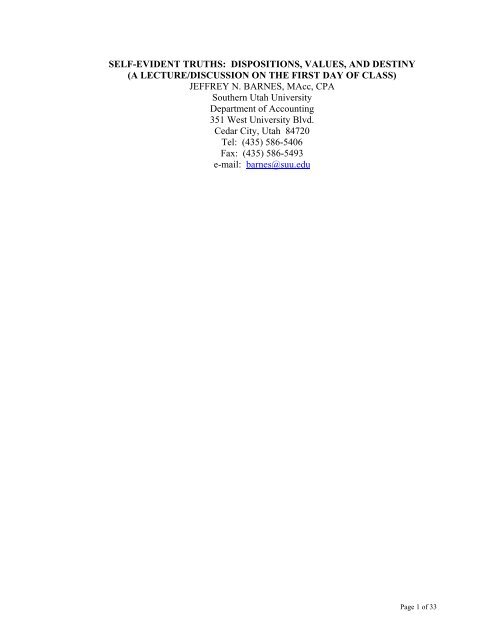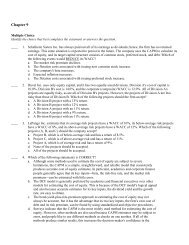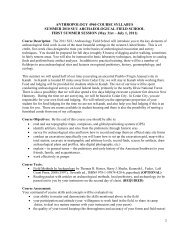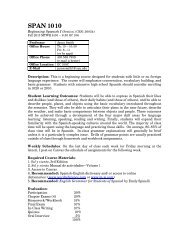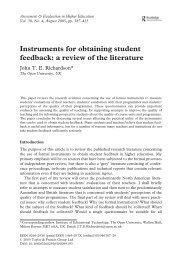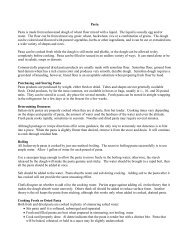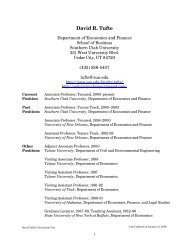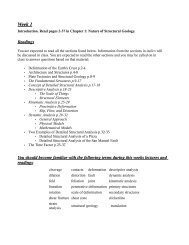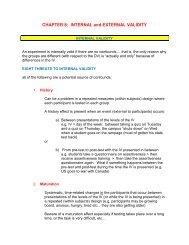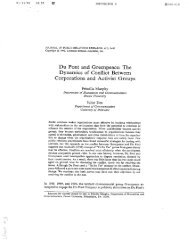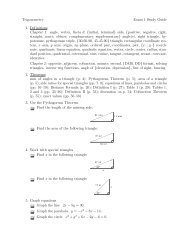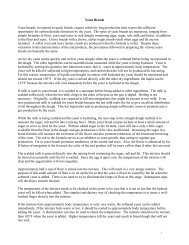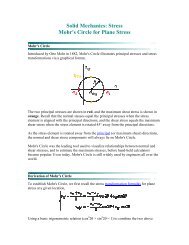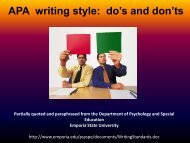Jeffrey Barnes: Self-Evident Truths - Southern Utah University
Jeffrey Barnes: Self-Evident Truths - Southern Utah University
Jeffrey Barnes: Self-Evident Truths - Southern Utah University
Create successful ePaper yourself
Turn your PDF publications into a flip-book with our unique Google optimized e-Paper software.
SELF-EVIDENT TRUTHS: DISPOSITIONS, VALUES, AND DESTINY<br />
(A LECTURE/DISCUSSION ON THE FIRST DAY OF CLASS)<br />
JEFFREY N. BARNES, MAcc, CPA<br />
<strong>Southern</strong> <strong>Utah</strong> <strong>University</strong><br />
Department of Accounting<br />
351 West <strong>University</strong> Blvd.<br />
Cedar City, <strong>Utah</strong> 84720<br />
Tel: (435) 586-5406<br />
Fax: (435) 586-5493<br />
e-mail: barnes@suu.edu<br />
Page 1 of 33
SELF-EVIDENT TRUTHS: DISPOSITIONS, VALUES, AND DESTINY<br />
(A LECTURE/DISCUSSION ON THE FIRST DAY OF CLASS)<br />
ABSTRACT<br />
To communicate a propositional model of positive behavior based<br />
primarily upon sensory self-examination. To encourage students to<br />
examine the reality around them and to discern “self-evident” truths that<br />
ennobles them and contributes to society’s well being. To create<br />
discussion and motivate the student to seriously ponder about ethical<br />
decision models using traditional values and morality. To assist the<br />
individual student to better shape his/her decision-making toward<br />
consequences that lead to personal happiness and society’s well being.<br />
Page 2 of 33
Purpose:<br />
SELF-EVIDENT TRUTHS: DISPOSITIONS, VALUES, AND DESTINY<br />
(A LECTURE/DISCUSSION ON THE FIRST DAY OF CLASS)<br />
ABSTRACT<br />
To communicate a propositional model of positive behavior based<br />
primarily upon sensory self-examination. To encourage students to<br />
examine the reality around them and to discern “self-evident” truths that<br />
ennobles them and contributes to society’s well being. To create<br />
discussion and motivate the student to seriously ponder about ethical<br />
decision models using traditional values and morality. To assist the<br />
individual student to better shape his/her decision-making toward<br />
consequences that lead to personal happiness and society’s well being.<br />
This lecture/discussion is to encourage students to think seriously about their ethical<br />
decision-making process. The overall objective is to impress upon the student the<br />
importance of ethical behavior in both personal and business life.<br />
How to use:<br />
The professor may use this lecture on the first day of class when most students have yet<br />
to obtain their books, syllabus, or have any assignments prepared for class. Dispersed<br />
throughout the lecture/discussion are probing questions that are intended to be discussed<br />
in class.<br />
Which course:<br />
This lecture is broad enough to be useful in a wide variety of courses—from accounting<br />
to management and at any class level.<br />
Usefulness:<br />
As any particular business course proceeds through a term, ethical cases/scenarios are<br />
often presented in the text or by professor materials. Most such ethical story vignettes can<br />
be linked back to this lecture’s fundamental premises.<br />
Resource for students:<br />
The professor can attach this lecture to his/her website or business-course network,<br />
allowing student to download the file for course and/or personal use.<br />
Page 3 of 33
SELF-EVIDENT TRUTHS: DISPOSITIONS, VALUES, AND DESTINY<br />
(A LECTURE/DISCUSSION ON THE FIRST DAY OF CLASS)<br />
INTRODUCTION<br />
Today, we have an opportunity to discuss important, timely, and ethical issues. We have<br />
yet to prepare for this course’s specific materials, so I would like to present to the class,<br />
for discussion and musing, an ethical decision-making model. Ethics is not a study which<br />
is primarily concerned with getting people to do what they believe to be right, but rather<br />
with helping them decide what is right.” (Jones, 1969) This presentation will not be<br />
about the unethical and illegal improprieties occurring at Enron, Tyco, WorldCom, or<br />
about the Arthur Andersen collapse, or about the complexities of accounting for<br />
derivatives and hedging instruments, or about how a CPA might audit such transactions<br />
to test management’s financial statement assertions, or how management makes decisions<br />
to report financial information in the most advantageous manner. We are going to speak<br />
to the moral base for which all these problems stem.<br />
We live in a turbulent time. We are experiencing wars, terrorism, business failures,<br />
illegal business transactions, and in general, unethical conduct throughout society. These<br />
are not times too dissimilar from those of ancient Greece and other previous great world<br />
civilizations. Plato experienced these issues himself and wrote about them (Beavers,<br />
2003).<br />
In Plato’s work, The Republic, he implies something that should cause us to contemplate.<br />
This contemplation will spur introspection and thought on these very issues. Plato<br />
implies that the ultimate aim of education is the training of character (Jowett, 1956:397-<br />
478).<br />
________________________________________________________________________<br />
What is character? Can you think of a person you believe has character? What personal<br />
values define a person’s character? Should a person’s character change for each venue<br />
he finds himself/herself in—family, business, community, church, etc?<br />
________________________________________________________________________<br />
The primary objective of education is to help students find truth and wisdom. The<br />
current educational experience is diced, sliced, specialized, and compartmentalized.<br />
Educational institutions have dropped courses that would probe the deeper questions<br />
impacting life—courses such as philosophy and ethics that taught individual- and<br />
societal-, morality, virtue, and beauty. And what has replaced these most valuable<br />
courses? Courses such as multiculturalism, environmentalism, and/or homosexuality have<br />
taken their place (Bork,1997:250-271). In such “progressive,” “intellectual,” or<br />
“advanced” learning environments, students are rarely challenged to closely examine<br />
life’s realities to discern what has been termed “self-evident truths.”<br />
Page 4 of 33
________________________________________________________________________<br />
What philosophy courses are taught at this institution of higher education? Does your<br />
field of study require philosophy courses? Have you ever taken an elective course in<br />
philosophy? Do you believe it important to train your thinking to better determine what<br />
truth is? Do you believe values are the same as virtues?<br />
________________________________________________________________________<br />
<strong>Self</strong>-evident truths are intuitive, natural, discernable and obvious to the senses, which is<br />
reality. <strong>Self</strong>-evident truths are also evidenced by the fact that any proposition to their<br />
opposite is absurd. A battle for truth by reason versus truth by senses has been waging<br />
for centuries. The thinking of Plato, Pyrrho, Descates, Leibnitz, Kant, Hegel and other<br />
reasoners versus the thinking of Socrates, Galileo, Bacon, Hobbes, Locke, and Mill and<br />
other sensationers.<br />
Will Durant, a consummate historian and philosopher, studied over 20 civilizations and is<br />
well versed in human nature and practice. Durant explains, that those that discover truth<br />
through the senses . . .<br />
scorned as senseless a reason that dared to seek truths beyond the reach of sight<br />
and touch and taste and smell and sound. But surely, said Kant, mathematics was<br />
independent of sensation, true a priori, before experience; the square of 5 would<br />
be 25 no matter what the senses might say. No, answered Mill; we believe that<br />
2*2 = 4 only because we have again and again, in the experience of the individual<br />
or in the socially transmitted experience of the race, felt or seen 4 as the result of<br />
2 times 2. All knowledge, said Locke, is derived from sense, and even the loftiest<br />
deductions of higher mathematics are precariously uncertain until the experience<br />
of the senses stamps them with approval (Durant, 1941:28).<br />
Durant further states,<br />
It seemed to William James, against the background of an America too active to<br />
be patient with abstractions, that obscurity was not a prerequisite of philosophy,<br />
and that the meaning of truth was simple enough to be stated in terms that even a<br />
business man would understand. Truth was efficacy. Instead of judging an idea<br />
by its origins, or by deduction from inviolate first principles, James called it to the<br />
test of action, asked for its practical consequences when applied, and turned the<br />
face of thought again to things. . . Bacon’s view, that ‘the rule which is most<br />
effective in practice is also most true in theory,’ and of Bentham’s maufacturing<br />
philosophy, that utility is the test of all (Durant, 1941:30).<br />
Through life’s experience, people create their own philosophical framework. Life’s<br />
experiences tend to reveal self-evident truths. We are able to identify these truths when<br />
we have thought and considered deeply enough upon these experiences that our mind and<br />
Page 5 of 33
heart come to the same conclusion. Blaise Pascal, a mathematician who lived 1623 to<br />
1662, said,<br />
“We arrive at truth, not by reason only, but also by the heart (Lewis, 2000).”<br />
Could this notion that truth be found through reason and the heart be referring to a<br />
person’s intuition, his/her conscience? When Socrates declared by which method he was<br />
able to ultimately test the truth and discover it he said,<br />
“Some one may wonder why I go about in private giving advise and busying<br />
myself with the concerns of others, but do not venture to come forward in public<br />
and advise the State. I will tell you why. You have heard me speak at sundry<br />
times and divers places of an oracle or sign which comes to me, and is the divinity<br />
which Meletus ridicules in the indictment. This sign, which is a kind of voice,<br />
first began to come to me when I was a child; it always forbids but never<br />
commands me to do anything which I am going to do.” (Jowett, 1956: 76-77).”<br />
Education should help create the mature mind, which is a vigorous mind and heart,<br />
oriented toward reality, expanding the intellect within us, wherein the “knowing mind”<br />
dwells (Cowan, 2001). Yet this mode of knowledge is increasingly dismissed in higher<br />
education. From this rather dismal introduction, the necessity of combating this<br />
regrettable state of affairs is obvious. The framework or model, that follows, posits that<br />
the cultivation of a proper disposition and the willingness to recognize and personally<br />
integrate proper values will lead to greater happiness. As individuals cultivate a proper<br />
disposition, by daily decision-making influenced by acceptance of proper values, greater<br />
joy and happiness in this life will be achieved.<br />
________________________________________________________________________<br />
What is your definition of truth? How do you discern truth? Do you find yourself<br />
persuaded only by reason? Do you use your conscience to discern truth? Do you find<br />
yourself persuaded only by experience? Can these two modes of discovery be<br />
harmonized?<br />
________________________________________________________________________<br />
Plato was a student of Socrates, 399 BC. Plato experienced societal upheaval of war,<br />
despotism, radical democracy, societal decline, and more personally, the death of his<br />
mentor, Socrates. These experiences impacted Plato. He studied with the great<br />
philosophers and thinkers of his time. He traveled extensively, traveling from Greece to<br />
Italy, to Egypt and then back to Greece. Plato, echoing his mentor Socrates, thought it<br />
important to examine one’s life and to hold on to that which is good. Plato, if anything,<br />
“was a moralist, and his primary objective as a philosopher is to figure out the best way<br />
to live one's life and to convince others to live this way or, if one can't discover the best<br />
way to live, then to devote one's life to the discovery of it (Beavers, 2003).”<br />
Page 6 of 33
FUNDAMENTAL PROPOSITION<br />
Figure 1.<br />
Fundamental Proposition<br />
Proper Proper Greater<br />
Disposition recognizes Values leads to Happiness<br />
What is a proper disposition? The pursuit of truth is a good and proper disposition.<br />
Socrates said,<br />
“And if again I say that to talk every day about virtue and the other things about<br />
which you hear me talking and examining myself and others is the greatest good<br />
to man, and that the unexamined life is not worth living…(Jowett, 1956: 84).”<br />
It is through the examination of life’s experiences, that truth is found. In that<br />
examination, truths are “self-evident.” These manifested truths lead to recognizing<br />
proper values. Proper values should then become the individual’s true aim, goal, or<br />
strivings in life. Such integration of proper values ultimately determine destiny.<br />
As we live and observe several different societal cultures, or forms of life, we can<br />
observe their outcomes or evidences of benefits, advances, or good characteristics, as<br />
well as detriments, retreats, or bad characteristics. We use reason and rationality to<br />
discriminate between competing cultural values or norms.<br />
Even though no direct evidence of Socrates’ own writing, secondary sources of some of<br />
his discourses, statements, and “Socratic” musings do exists, thanks to Plato. The<br />
following colloquy could have occurred between Socrates and Protagoras—it almost<br />
sounds familiar today:<br />
Protagoras: Truth is relative. Truth is only a matter of opinion.<br />
Socrates: You mean that truth is mere subjective opinion?<br />
Protagoras: Exactly. What is true for you is true for you, and what is true for me,<br />
is true for me. Truth is subjective.<br />
Socrates: Do you really mean that? My opinion is true by virtue of its being my<br />
opinion?<br />
Protagoras: Indeed I do.<br />
Socrates: My opinion is: Truth is absolute, not opinion, and that you, Mr.<br />
Protagoras, are absolutely in error. Since this is my opinion, then you must grant<br />
that it is true according to your philosophy.<br />
Protagoras: You are quite correct, Socrates.<br />
Page 7 of 33
________________________________________________________________________<br />
Who won this debate about truth? Is truth relative or absolute? Restate Protagoras’<br />
position regarding truth. Restate Socrates’ position regarding truth.<br />
________________________________________________________________________<br />
Today, some would say, as Protagoras, that truth is not absolute, that nobody can tell<br />
another person what truth is, that truth is relativistic, that truth is subjective, and that truth<br />
can not be discerned. Well, such crowds of non-self-examining fools are wrong. They<br />
are as wrong as social theorists that reject as most optimal, societies that promote<br />
democracies, democratic capitalism, and the structure of law that protects life, liberty,<br />
property, and the freedom of conscience. (Hayek; Muravchik; Novak) They are as wrong<br />
as those sexual relativists that reject millennia of evidence that the optimal nuclear family<br />
structure begins with a male and female partnership. (Cameron; Lerner; Tasker; Wilkins;<br />
Marriage Law Project 2000) They are as wrong as those political idealists that reject<br />
“natural-law” evidence. (Muravchik; Vazsonyi) They are as wrong as those social<br />
engineers that believe “equality of opportunity” is somehow the same as “equality of<br />
outcome.” (Adams; Dalrymple; Kirk: 213; Sowell, 1999: 53) They are as wrong as those<br />
that believe that all persons are equal in that they have the same drives, dispositions,<br />
habits, motivations, and desires in life, ignoring universal principles and natual-law<br />
evidence, therefore all should have and desire the same station or status in life. (Kirk,<br />
1995: 23-24) They are as wrong as those “dotcom” companies that collapsed into<br />
miserable bankruptcy because they thought the old economic rules no longer applied,<br />
when in fact, as in all the above cases, the truth was otherwise.<br />
________________________________________________________________________<br />
Has the author presented valid observations? Do any of these statements offend you? Is<br />
it acceptable to have opinions that may offend another person? Can inquiry plumb for<br />
the truth when uncomfortable opinions and ideas are left out of the discussion?<br />
________________________________________________________________________<br />
There are fundamental truths that all will discover. These fundamental truths are selfevident,<br />
and they can only be found through objective examination of reality. Truth is<br />
the conformity of a proposition to the way things are. So, as individuals develop<br />
recognition of what truth is and the associated proper values that emanate therefrom and<br />
adhere to such self-evident values, they will find greater happiness in this life. Will<br />
Durant wrote,<br />
Let philosophy concede, then, that not in philosophy but in life man must find his<br />
keenest satisfaction; not in the library or the monastic cell, but in the harmonious<br />
fulfillment of his natural and oldest instincts. Happiness is unconscious because it<br />
comes on when we are natural; if we stop to analyze it, it disappears, because it is<br />
Page 8 of 33
unnatural to stop and analyze. If the intellect contributes to happiness it must be<br />
not as a primary source, but as the medium of coordination, the instrument<br />
whereon we evoke a harmony of desire. . .<br />
We need only clear our minds and cleanse our hearts, and that great company will<br />
welcome us, and pass on their lore to us as graciously as ancient sages loved to<br />
instruct youth. When meanness is gone from us and we have learned to honor<br />
truth even when it leans away from our desire, we shall be fit pupils for Aristotle<br />
and Spinoza, for Whitman and Euripides, for Pheidias and Leonardo, for<br />
Nietzsche and Christ (Durant, 1941: 621-625).<br />
Answer the age-old question, “What good is truth?” Well, understanding and living the<br />
truth will make you happy. So, back to the posited fundamental proposition,<br />
• A proper disposition is a desire to seek truth through examination, which leads to<br />
recognizing proper values, and that<br />
• proper values lead to identifying worthy goals and aspirations, which become the<br />
quest in life and leads to greater happiness, which<br />
• greater happiness is the natural outcome of harmonious alignment with truth.<br />
THE PROPER DISPOSITION<br />
What is the proper disposition that ought to possess in our quest for happiness? It ought<br />
to be a disposition to learn, by obtaining knowledge and understanding, through the<br />
examination of reality. Truth will discipline all. As individuals fall into many errors,<br />
thinking they know the truth, the consequential pains will teach otherwise. Having a<br />
proper disposition will enable individuals to learn from such experiences.<br />
THE PROPER VALUES<br />
From personal examination and the examination of other experienced and wise persons, I<br />
have come across some maxims that appear to be truths, and if followed, will bring<br />
happiness. Today, there are two maxims, of many, I wish to present:<br />
• Seek to increase individual virtue and morality and eschew that which is<br />
vulgar, and<br />
• Seek to possess individual honesty and integrity.<br />
Why these two maxims?, because these two self-evident truths need our constant<br />
vigilance, both in our personal and in our business decision-making modes.<br />
Page 9 of 33
________________________________________________________________________<br />
What is a maxim? Is a maxim a philosophical “first principle”? Have you ever thought<br />
of your own behavioral model for happiness? Can an individual model of personal<br />
happiness leave out the concern for community? Are consequential results—short-term<br />
and/or long-term in your construct? Are pleasures the same as happiness?<br />
________________________________________________________________________<br />
The Josephson Institute of Ethic mused on the human quest of happiness, it wrote,<br />
“Enlightenment philosophers and the American Founding Fathers enshrined the pursuit<br />
of happiness as a basic right of free men. But is this pursuit a moral end in itself? It<br />
depends on how one defines happiness. Our values, what we prize and desire, determine<br />
what we think will make us happy. We are free to pursue material goals and physical<br />
sensations, but that alone rarely (if ever) leads to enduring happiness. It more often<br />
results in a lonely, disconnected, meaningless existence. The morally mature individual<br />
finds happiness in grander pursuits than money, status, sex and mood-altering substances.<br />
A deeper satisfaction lies in honoring universal ethical values (values), that is, values that<br />
people everywhere believe should inform behavior. That unity between principled belief<br />
and honorable behavior is the foundation for real happiness (Josephson, 2002).”<br />
It is the becoming the morally mature individual that should be our aim. Seeking an<br />
understanding of and integrating proper values or values brings long-lasting peace and<br />
happiness and is the struggle we all face. Think soberly and contemplate, are not virtue<br />
and morality and the avoidance of vulgarity a noble and right thing?<br />
VIRTUE AND MORALITY<br />
Figure 2.<br />
Seek to Increase Individual Virtue and<br />
Morality and Eschew that which is Vulgar<br />
Proper Proper Greater<br />
Disposition Values Happiness<br />
Observations about virtue and greater trusting<br />
personal and others’ recognize morality are leads to relationships between<br />
experience regarding values individuals, families,<br />
virtue- and moral- to incorporate in community, and thus society<br />
interpersonal behavior a person’s ethic, benefited.<br />
Page 10 of 33
Some philosophical discussions view being moral and virtuous related to living in<br />
concordance with the “good” values identified by reason and evidence. (See list of<br />
selected values in the appendix). Some philosophical musing ask, “Why be moral?”<br />
This paper’s propositional model declares that being moral brings greater happiness and<br />
contentment to the individual and society. The absurd question would be “Why not be<br />
immoral?” The trail of evidence, especially those which are long-term in nature and not<br />
so readily identified, bears witness to the obvious reasons to not live immoral lives. My<br />
propositional model does well by asking the reader to integrate into action the desire to<br />
live virtuous, moral, and good lives.<br />
Why should we be concerned for virtue and morality? There appear, through<br />
philosophical deliberations, to be five supporting reasons:<br />
(1) To keep society from falling apart,<br />
(2) To ameliorate human suffering,<br />
(3) To promote human flourishing,<br />
(4) To resolve conflicts of interest in just and orderly ways, and<br />
(5) To assign praise and blame, reward and punishment, and guilt.<br />
(Pojman, 2002: page 17)<br />
These five reasons apparently sustain an orderly society in which all individuals can<br />
experience greater happiness and peace. Aristotle wrote,<br />
The end toward which men strive in life is happiness. Happiness for each<br />
creature is founded in the best possible performance of the function for which he<br />
is peculiarly adapted. Man then finds his highest and most lasting happiness in<br />
the active life of his soul in accordance with virtue.<br />
________________________________________________________________________<br />
What is you definition of virtue? Does ancient greek definition of virtue differ from a<br />
contemporary American definition of virtue?<br />
________________________________________________________________________<br />
Richard Vetterli and Gary Byrner wrote concerning the evolving definition of virtue in<br />
public discourse and politics:<br />
Recent scholarship on the American founding has often failed to give sufficient<br />
attention to the evolutionary character of the concept of virtue. When historians<br />
refer to virtue, they are often drawn back to classical antiquity, narrowing their<br />
definition of the term to its ancient expression, and confusing it with the ‘modern’<br />
concept of virtue. Centuries before the Constitution was written, the concept of<br />
virtue had begun its metamorphosis. It had, over time, become infused with<br />
biblical Christianity, which had become a kind of ‘general Christianity,’ even<br />
Page 11 of 33
within medieval Christendom, and had emerged as a body of moral precepts<br />
(Vetterly, 1996: 6).<br />
Morality, which is paramount to a civil society, begins with self. Our second president<br />
John Adams, stated,<br />
That the first want of man is his dinner, and the second his girl were truths well<br />
known to every democrat and aristocrat, long before the great philosopher<br />
Malthus arose, to think he enlightened the world by the discovery (Burke, Vol.<br />
III: 79).<br />
Yet this is a mere contemptuous half-concession; man’s nature. Men are weak<br />
and foolish, especially when deprived of proper leadership and good institutions.<br />
They are not mere creatures of appetite; nor are they by instinct selfish.<br />
LaRochefoucauld erred when he thought self-love was the ruling passion of<br />
humanity—or at least, he did not define that longing properly, which is more<br />
specifically “a desire to be observed, considered, esteemed, praised, beloved, and<br />
admired by his fellows.<br />
The yearning for good repute, then, may be diverted from a possible course of<br />
vice to one of general benefit. But the weakness and ignorance of man leave him<br />
continually exposed to tempting love of gold, love of praise and ambition, as well<br />
as impulses less than these aristocratical passions.<br />
Only religious faith, stable institutions, and candid recognition of his own failings<br />
can withhold man from the spiritual destruction that lurks at the back of such<br />
appetites. Men must try to attain balance of the affections and appetites, governed<br />
by reason and conscience. If they surrender the guidance for any course of time<br />
to any one passion, they may depend upon finding it, in the end, a usurping,<br />
domineering, cruel tyrant.<br />
They were intended by nature to live together in society, and in this way to<br />
restrain one another, and in general they are a very good kind of creatures; but<br />
they know each other’s imbecility so well that they ought never to lead one<br />
another into temptation. The passion that is long indulged and continually<br />
gratified becomes mad; it is a species of delirium; it should not be called guilt, but<br />
insanity (Woolf, 1931: 177).”<br />
Adams was easy with comparing individual emotions with that of society’s emotions. In<br />
reality, the individual parts do make up the whole society. So we must be careful in what<br />
passions we pursue. We must be careful in learning to balance our passion, or in other<br />
words, we must learn to bridle our passions. Good men and women of all ages have been<br />
emphasizing this importance. The lover of virtue combats vulgarity. Today, 6 out of 9<br />
men and women in black robes say that virtual child pornography is free speech (US<br />
Supreme Court, June 26, 1997). Well, they may set what is “legal” today, but that does<br />
not mean that what they set is virtuous, good, praiseworthy, or moral. And they are<br />
Page 12 of 33
simply wrong. Recently, 3 federal appellate judges say that public libraries can not be<br />
compelled to have filtering software to protect our communities from pornography (child<br />
and otherwise) because “free speech” is more sacrosanct than community standards of<br />
morality desiring censorship (Eastern District of Pennsylvania, June 23, 2003). As<br />
previously stated, just because they say it is “free speech,” doesn’t mean that their<br />
judgment is right, just currently legal. The rhetoric of the vulgar-supporting lawyers has<br />
always harmed society. Such rhetoric for the vulgar has helped weaken previous<br />
societies.<br />
________________________________________________________________________<br />
Do you believe that John Adams was correct about the importance of institutions<br />
(churches, benevolent associations, etc.) helping to moderate and control appetites?<br />
Does religion perform an important role in society? Have people used religion to<br />
perpetrate evil in the world and does such use of religion negate the benefits of religious<br />
institutions?<br />
________________________________________________________________________<br />
With regard to “listening” to both your reason and conscience, Socrates exposed how he<br />
found truth and what made him so adamant about it. Plato writes, in the Apology, what<br />
Socrates taught about finding of truth,<br />
Some may wonder why I go about in private giving advice and busying myself<br />
with the concerns of others, but do not venture to come forward in public and<br />
advise the State. I will tell you why. You have heard me speak at sundry times<br />
and in divers places of an oracle or sign which comes to me, and is the divinity<br />
which Meletus ridicules in the indictment. This sign, which is a kind of voice,<br />
first began to come to me when I was a child; it always forbids but never<br />
commands me to do anything which I am going to do (Jowett, 1956: 77-78).<br />
The great English legislator, Edmund Burke, observed:<br />
Men are qualified for civil liberty in exact proportion to their disposition to put<br />
moral chains upon their own appetites. . .Society cannot exist, unless a controlling<br />
power upon will and appetite be placed somewhere; and the less of it there is<br />
within, the more there must be without. It is ordained in the eternal constitution<br />
of things, that men of intemperate minds cannot be free. Their passions forge<br />
their fetters (Burke, Vol. 4: 41-52).<br />
________________________________________________________________________<br />
What do you think Socrates was talking about regarding this “oracle?” What does it<br />
mean to say, “Their passions forge their fetters?” In 2003, did the Laker guard Kobe<br />
Bryant’s passion form any fetters?<br />
________________________________________________________________________<br />
Page 13 of 33
A famous writer about ancient manuscripts and writings, Hugh Nibley states,<br />
Cicero advises, don’t talk over people’s heads—they don’t like orators who make<br />
them feel stupid; best keep your books at home for private leisure (Cicero, 52).<br />
He might have cited the case of Hermodorus, who was banished from the<br />
illustrious city of Ephesus because he was guilty of excelling in something: “If he<br />
must excel,” they said, “let him go and excel over somebody else!” Cicero’s own<br />
opinion is that “an orator is pleasanter and more plausible to listen to” when he<br />
doesn’t indulge in a lot of high-brow stuff.” Everything must be accommodated<br />
to the common judgment and popular intelligence,” for the rhetor sells to<br />
everybody. To find out exactly what people wanted was the hardest part of the<br />
rhetor’s work and the secret of his success; it was the canvass or survey, the<br />
careful trial-and-error game of emperiria, “to pick out just those things that appeal<br />
most to listeners, and not only delight them, but entertain without ever tiring<br />
them.” Once you had that, the rest was easy, simply “to scratch and tickle the<br />
ears of those who want to be tickled.” Taking care never to speak harshly to<br />
them.<br />
The landslide of vulgarism once started could not be stopped. Good men were<br />
intimidated and banished from the cities by mobs who could always count on<br />
finding orators that would never contradict them, society reserving its richest<br />
rewards for those who could justify, condone, and confirm its vices. Even a<br />
strong-minded emperor who tried to stem the tide could wreck his cause by<br />
refusing to play along with the show-bred city crowds, and even risk his person if<br />
he dared to talk back to them.<br />
The frustration against the vulgar rhetor was pronounced by Socrates, “I only am<br />
left alone and cannot agree, for you do not convince me; you only produce many<br />
false witnesses against me, in the hope of depriving me of my heritage, which is<br />
the truth (Nibley, 1991: 260-261).<br />
So watch out for the pleasant, yet vulgar rhetor because if you know that virtue is good<br />
then vulgarity is bad. There is no compromise between the two. There are eternal<br />
verities or truths—beauty, goodness, virtue, praiseworthiness—and you must always seek<br />
to discover them and cling onto them. Before throwing away the truth conventions of the<br />
past, think deeply about the immediate and long-term consequences of actions to be<br />
taken. Is what I am about to do a thing of beauty, goodness, virtue, or praiseworthiness?<br />
________________________________________________________________________<br />
Does rhetoric always support truth? Can a skilled rhetor persuade people to behave<br />
badly? Can a skilled rhetor persuade people to behave properly? How does mass media<br />
and popular culture impact society, positively or negatively?<br />
________________________________________________________________________<br />
Page 14 of 33
Vulgarity is the antithesis of virtue and beauty. Again remember, if virtue and beauty are<br />
good, then vulgarity is bad. Another thoughtful statement ponders, “If culture eventually<br />
makes politics, and a nation’s moral life is, of course, the foundation of its culture, ought<br />
we to be concerned as to what we embrace? (Bork, 1997: 2).” Vulgarity is on the<br />
increase, not decline in America—for that matter we are in the mists of a Western<br />
Decline. Robert Bork warns of our general degeneracy and deviancy,<br />
With each new evidence of deterioration, we lament for a moment, and then<br />
become accustomed to it. We hear one day of the latest rap song calling for<br />
killing policemen or the sexual mutilation of women; the next, of coercive leftwing<br />
political indoctrination at a prestigious university; then the latest homicide<br />
figures for New York City; Los Angeles, or the District of Columbia; of the<br />
collapse of the criminal justice system, which displays an inability to punish<br />
adequately and, often enough, an inability to convict the clearly guilty; of the<br />
rising rate of illegitimate births; the uninhibited display of sexuality and the<br />
popularization of violence in our entertainment; worsening racial tensions; the<br />
angry activists of feminism, homosexuality, environmentalism, animal rights—the<br />
list could be extended almost indefinitely (Bork, 1997: 3).<br />
A refrain by Alexander Pope reads (Monson, 1985: 111),<br />
Vice is a monster of so frightful mien,<br />
As to be hated needs but to be seen;<br />
Yet seen too oft, familiar with her face,<br />
We first endure, then pity, then embrace.<br />
________________________________________________________________________<br />
Is vulgarity on the rise in popular culture or on a decline? Why is it that mass media<br />
promotes the baser, darker side of human behavior—sexual promiscuity and violence?<br />
What do you think of Alexander Pope’s poem?<br />
________________________________________________________________________<br />
In writing about ethics in business, U.B. Rao, writes, “It was emphasized that certain<br />
values like honesty, personal morality, and transparency in interpersonal dealings were<br />
universal. Business ethics, it should be noted, cannot be viewed in isolation, disregarding<br />
the value systems of the general society. The common tendency, however, is to point a<br />
finger at others for lack of ethics and assume a “holier than thou” posture for oneself.<br />
Businessmen blame the government and vice versa. What is needed is serious<br />
introspection to identify the root causes of social and business evils like dowry, tax<br />
evasion, black money, corruption, profiteering, embezzlement, falsification of accounts,<br />
smuggling, etc. so that message of “ethics begins at home” gets ingrained among citizens<br />
and their leaders whether in business or in politics (Rao, 1996: 1).”<br />
Page 15 of 33
The question often arises, “Do the same moral standards apply to everyone?” Critics of<br />
the theory of ethical relativism point out that, because different people have different<br />
moral beliefs about some issue, it does not follow logically that there is no objective truth<br />
about that issue nor that all beliefs about that issue are equally acceptable. When two<br />
people or two group have different beliefs, philosophers are fond of pointing out, at least<br />
one of them is wrong (Valasquez, 2002: 23). For example, Philosopher James Rachels<br />
put the matter quite succinctly,<br />
The fact that different societies have different moral codes proves nothing. There<br />
is also disagreement from society to society about scientific matters: in some<br />
cultures it is believed that the earth is flat, and that disease is caused by evil<br />
spirits. We do not on that account conclude that there is no truth in geography or<br />
in medicine. Instead, we conclude that in some cultures people are better<br />
informed that in others. Similarly, disagreement in ethics might signal nothing<br />
more than that some prople are less enlightened than others. At the very least, the<br />
fact of disagreement does not, by itself, entail that truth does not exist. Why<br />
should we assume that, if ethical truth exists, everyone must know it? (Rachels,<br />
1980: 33-39)<br />
The onslaught of institutionalized degeneracy and deviancy can only be combated if we<br />
turn away. We must seek to be better drawn toward virtuous behavior and toward moral<br />
inclinations. The motivation for turning towards proper behavior always starts with self.<br />
Page 16 of 33
HONESTY AND INTEGRITY<br />
Figure 3.<br />
Seek to Possess Individual Honesty and Integrity<br />
Proper Proper Greater<br />
Disposition Values Happiness<br />
Observations about honesty and greater trusting<br />
personal and others’ recognizes integrity are leads to relationships, strength<br />
experience regarding values in interpersonal relationships.<br />
honesty and integrity to incorporate Opportunities arise from<br />
in a person’s ethic such trusting relationships<br />
and thus, society is benefited.<br />
_______________________________________________________________________<br />
Does your personal experience support the rationale of this model? Have your parents,<br />
clergy, or other trusted individuals ever taught you this truth? Is this truth assumption<br />
naïve and simplistic?<br />
________________________________________________________________________<br />
Marcus Arelius said,<br />
“A man ought to be upright, not kept upright (AICPA, 1989).”<br />
A person is honest who refuses to lie, steal, or deceive in any way. Honesty suggests an<br />
active or anxious regard for the standards of one’s profession, calling, or position. An<br />
honest person is free from fraud or deception. A line of philosophical inquiry always<br />
creates a moral dilemma with only two choices. For instance, “Would you lie to save<br />
your job?” What is that all about? Trying to find out what degree of honesty a person<br />
has? Is the breaking down of every statement’s ingredient to hypothetical principles<br />
always the best way to find truth? Moral dilemmas do exist, however, many of these<br />
kinds of questions are often false dilemmas and other ethical decision models, other than<br />
utilitarian or Kantian imperatives, must explain the proper behavior under these<br />
circumstances. Rarely does life present itself with only two such alternative choices.<br />
There are theories of moral behavior that can provide excellent models for understanding<br />
proper human behavior. W.D. Ross’s obligation-based theory is an excellent alternative<br />
to the principle of utility or Kant’s categorical imperative. Ross argues,<br />
There are some basic rules of moral obligation and that they do not derive from<br />
either the principle of utility or Kant’s categorical imperative. Some of Ross’s<br />
basic rules are as follows: “Promises create obligations of fidelity.” “Wrongful<br />
actions create obligations of reparation.” “The generous gifts of friends create<br />
obligations of gratitude.” . . . Ross defends his principles on the grounds of their<br />
faithfulness to the ordinary moral beliefs and judgments. He argues that to<br />
Page 17 of 33
determine one’s obligation, the greatest obligation in any given circumstance<br />
must be found on the basis of the greatest balance of right over wrong in that<br />
particular context (Beauchamp, 2001: 29).<br />
These newer expansive models of ethical behavior appeal to the explanation that best<br />
maximizes what most beneficially happens in reality. As stated above, the obligationbased<br />
theory is justified, “on the grounds of their faithfulness to the ordinary moral<br />
beliefs and judgments.” It follows, that the “ordinary moral beliefs and judgments”<br />
should come from persons of good character (Beauchamp, 2001: 33). Persons of good<br />
character are those that have discovered certain fundamental truths regarding proper<br />
behavior and have a reputation for living by such convictions, because they perceive<br />
greater happiness by so doing. Greater happiness is achieved by living congruently with<br />
these fundamental self-evident truths. These underlying self-evident truths are rooted in<br />
the virtues, sometimes referred to as a body of ethics called, character ethics—things<br />
as—integrity, humility, fidelity, temperance, courage, justice, patience, industry,<br />
simplicity, modesty, and the Golden Rule. Benjamin Franklin’s autobiography is<br />
representative of that literature (Covey, 1989: 18).<br />
________________________________________________________________________<br />
What is an example of an obligation-base moral decision? Can you put a moral weight to<br />
the various obligations arising from human behavior and thus be able to choose between<br />
two competing moral decisions? Is it important to identify persons of good moral<br />
behavior and to emulate their behavior? What do you think about “character ethics?”<br />
________________________________________________________________________<br />
What happens with so much contrived hypothetical conjectures is that you train people to<br />
believe that there are many real-world instances where lying is acceptable and you<br />
weaken the moral foundation of honesty. Philosophical inquiry should examine past<br />
experiences as lessons learned and such history can teach better behavior.<br />
In a dialog of Socrates with Protagoras, Protagoras at length displays a belief, with an<br />
observed truth, that honesty is taught and learned. An important statement or a<br />
“golden nugget” from Protagoras states,<br />
“And I will now endeavor to show further that they do not conceive this virtue<br />
(honesty) to be given by nature, or to grow spontaneously, but to be a thing which<br />
may be taught; and which comes to a man by taking pains (Jowett, 1956: 211). ”<br />
_______________________________________________________________________<br />
What did Protagoras mean when he stated, “but to be a thing which may be taught; and<br />
which comes to a man by taking pains?” What are some examples of the pains a person<br />
experiences when they are not honest and lack integrity?<br />
________________________________________________________________________<br />
Page 18 of 33
Through daily personal and interpersonal dealings, one expands one’s reputation<br />
regarding honesty. As one is tested in life’s crucible, tell-tale evidences are created that<br />
show whether or not a person is honest in his dealings. One can not be an honest man in<br />
one sphere of personal interaction and dishonest in another sphere of personal interaction<br />
and be an honest man. You are honest if you are honest, period. Honest is the man that<br />
pays his lawful taxes and is honest in his duty to sexual fidelity with his wife. Dishonest<br />
is the man that cheats on his taxes and is honest in his duty to sexual fidelity with his<br />
wife. Honesty really can not be compartmentalized.<br />
Is it more important to be honest with your payment of taxes or with your fidelity to your<br />
wife? What is this query all about? Such a question leads to wrong thinking. It is<br />
important to be honest in both personal relationships and business dealings. By siding<br />
with marital fidelity as being much more important does not excuse the pain that will<br />
come by being dishonest in paying your taxes. In real life, you are expected to be honest<br />
in both and that such “either/or” dilemmas rarely arise. If such unrealistic dilemmas are<br />
experienced, then the choices are weighed and the choice that has the greatest moral<br />
significance is chosen. A choice must be made and consequences are sure to follow.<br />
A person has integrity when that person adheres to a code of moral values. There is<br />
predictability in a person who possesses integrity. Such a person is undivided and not<br />
double-minded about issues. However, a person with integrity is always willing to<br />
acknowledge unknown facts when presented their validity, which consequentially might<br />
change his/her opinion—that is being open-minded and not being double-minded. A<br />
person with integrity does not leave his rational, objective, and fact-finding disposition at<br />
the door of the church, nor does the person with integrity leave his disposition toward<br />
faith at the door of the university. Personally, both qualities regarding integrity are<br />
indispensable for the progress of the rational man.<br />
Kenneth R. Andrews, responding to an article, “Why Be Honest if Honesty Doesn’t Pay,”<br />
by Amar Bhide and Howard H. Stevenson, states,<br />
The assumption that honesty should be pursued out of self-interest and financial<br />
reward evades the tough truth that moral behavior in business originates (often<br />
with difficulty) in individual conscience supported by company policies,<br />
community standards, government regulations, and the law. The authors assert<br />
the ‘we can be proud of a system in which people are honest because they want to<br />
be.’ I question want to be rather than are free to be. In the face of personal,<br />
corporate, and government scandals…I worry about the robustness of individual<br />
conscience and the community norms that are supposed to support it. If trust is to<br />
survive treachery, our next concern is conscience itself. How can we encourage<br />
moral behavior when educational, religious, family, and community discipline<br />
weaken against the problems of modern society? (Andrews, 1990: 216-217)”<br />
Page 19 of 33
Michael Novak, is perhaps the preeminent Roman Catholic social theorist of our time.<br />
He has written a classic book about social economic theory. Novak’s book, The Spirit of<br />
Democratic Capitalism, explains how integrity and honesty are paramount in the<br />
operation of democratic capitalism. His book is a scholarly work and is a classic…in the<br />
field of political and economic philosophy. Novak’s purposes in writing this book were:<br />
• to defend democratic capitalism from the utopian challenge of socialism;<br />
• to demonstrate that democratic capitalism’s principles are not only practical, but<br />
that, even in the abstract, they are superior to the socialist vision;<br />
• to provide a theoretical framework for democratic capitalism;<br />
• to persuade theologians and others that the values of democratic capitalism are not<br />
only consistent with, but supportive of, those of Christianity; and<br />
• to begin the construction of a theology of capitalism. (Younkins)<br />
Honesty and integrity in society always starts with self.<br />
CONCLUSION<br />
Be aware that as one progresses in the personal discovery of truth, they will find out<br />
about the differences of cultural preferences versus cultural values. Cultural preferences<br />
about what to wear, what and when to eat, how to conduct oneself in initial meetings of<br />
introduction, etc, are not the same as cultural values. Cultural values tend to be<br />
somewhat similar, across many different cultures, regarding the larger issues of human<br />
behavior, such as, the sanctity of life, the desire for individual liberty, the sanctity of<br />
family organization, the importance of chastity and fidelity, the expectation of honesty<br />
and integrity, and etc.<br />
Today, there is an onslaught of efforts by certain relativistic social theorists that seek to<br />
reduce the importance of these time-tested and important major cultural values. Many of<br />
these relativistic social theorists deride these time-tested and traditional cultural values<br />
and exhibit malice towards those espousing traditional values. This ostracistic behavior is<br />
not new, in ancient Greece, the tale of Aristides the Just goes,<br />
The honors that the Athenians gave Aristides, as his virtues became more widely<br />
known through his actions, drove Themistocles crazy with jealousy.<br />
Themistocles even accused Aristides of trying to make himself a king by being so<br />
just.<br />
Since the victory at Marathon, everyone resented anyone who stood above the<br />
rest. So just after they had honored Aristides for his justice and quiet integrity,<br />
they banished him by ostracism [482 B.C.].<br />
Page 20 of 33
Ostracism was done by popular vote, with pottery fragments used as ballots.<br />
When an ostracism was called, the citizens of Athens would gather in the<br />
marketplace and write the name of the man they wanted to ostracize on their<br />
ballot, then toss it into a pen. If less than six thousand ballots were cast, there was<br />
no ostracism, but if there were enough ballots, then the man whose name<br />
appeared most often on the pottery fragments was exiled for a period of ten years.<br />
On the day of the voting, there was an illiterate man from the country who asked<br />
Aristides to help him write "Aristides" on his ballot. Aristides asked the bumpkin<br />
whether this Aristides had ever done him any wrong, and got the following reply:<br />
"No. In fact, I don't even know who Aristides is, but I'm tired of hearing everyone<br />
call him 'The Just.'" Without another word, Aristides did as he was asked.<br />
(McCutchen)<br />
Abundant evidence demonstrates that virtue, morality, honesty and integrity are<br />
indispensable pillars for individual happiness and social order. Breaking these timetested<br />
self-evident truths will bring the weight of pain generally experienced by so many<br />
persons. Past experience is a schoolmaster that never tires at straightening our thoughts<br />
and hopefully our actions regarding the consequences of breaking these verities.<br />
Whether in our business transactions, family relationships, community interactions, or<br />
any other interpersonal relationships, conforming to these self-evident truths will result in<br />
much greater happiness.<br />
Page 21 of 33
APPENDICES<br />
Page 22 of 33
APPENDIX I<br />
POTTER’S BOX<br />
Many persons have sought to better understand, as Professor Les Jones, Psychology<br />
Professor at <strong>Southern</strong> <strong>Utah</strong> <strong>University</strong>, would say, “Why do I do the things I do when I<br />
know what I know?” In the quest for understanding human achievement and failing,<br />
many a philosopher has created their own explanatory decision-making model. Dr. Ralph<br />
Potter, of Harvard Divinity School, created what is popularly known as the Potter’s Box.<br />
The model is used for mapping out why people do the things they do. The model<br />
involves the use of (1) clarification of the extant facts under consideration, (2)<br />
clarification of personal values, (3) identification of principles under effect, and (4)<br />
determining where one’s loyalties are greatest.<br />
Step #1 Define the situation<br />
Understand the issue<br />
confronting you, have all<br />
relevant facts.<br />
Step# 2 Identify values<br />
Determine your personal<br />
values, along with those of<br />
whom you have a primary<br />
affiliation. May be conflicting<br />
values.<br />
Step #4 Choose Loyalties<br />
Determine where your greatest<br />
loyalties lie. With your person,<br />
your family, your work associates,<br />
and/or your God, etc. May be<br />
conflicting. With greatest<br />
sensitivity and objectivity,<br />
adjudicate the ethical/moral<br />
conflict.<br />
Step #3 Apply Ethical Principles<br />
Examine various ethical principles<br />
and see which best apply to the<br />
situation. More than one may be<br />
appropriate.<br />
Page 23 of 33
APPENDIX II<br />
LIST OF VALUES<br />
You can make a list of values by asking yourself, “What sort of things are valuable?<br />
What do you consider good or desirable? (modified, Rescher, 1969, p.16)<br />
Purely Intrinsic goods (not derived from anything else):<br />
Beauty (aesthetic)<br />
Clarity (intellectual)<br />
Comfort (material/physical)<br />
Fairness (moral)<br />
Faith (religious)<br />
Fidelity (social)<br />
Freedom (political)<br />
Generosity (social)<br />
Grace (aesthetic)<br />
Graciousness (social)<br />
Health (material/physical)<br />
Honesty (moral)<br />
Integrity (moral)<br />
Intelligence (intellectual)<br />
Joy (aesthetic)<br />
Kindness (moral)<br />
Knowledge (intellectual)<br />
Life (moral)<br />
Obedience (intellectual)<br />
Politeness (social)<br />
Physical security (material/physical)<br />
Piety (religious)<br />
Privacy (social)<br />
Productiveness (economic)<br />
Rationality (intellectual)<br />
Symmetry (aesthetic)<br />
Virtue (religious)<br />
Purely instrumental goods (leading to a good):<br />
Promote human happiness (derived from joy)<br />
Thou shalt not murder (derived from life)<br />
Thou shalt not deprive persons of their freedom (derived from freedom)<br />
Respect person’s privacy (derived from privacy)<br />
Thou shalt not commit adultery (derived from fidelity)<br />
Promote economic security/welfare (derived from economic)<br />
Promote equal justice under law (derived from political)<br />
The advancement of new and useful medicine (derived from health)<br />
Making money (derived from productiveness)<br />
Page 24 of 33
APPENDIX III<br />
FOUR MAJOR ETHICAL DECISION-MAKING PRINCIPLES<br />
Categorical Imperative. Immanuel Kant (1724-1804)wrote a small treatise on ethics<br />
entitled, “Groundwork of the Metaphysics of Morals.” He is considered the greatest<br />
philosopher of the German Enlightenment. He was born in East Prussia in 1724 and was<br />
a significant influence on Western philosophy. He believed that the use of reason could<br />
find a consistent, nonoverridable set of moral principles. (Pojman, 2002: page 138) A<br />
categorical imperative is a decision to perform an act that is based on a moral law no less<br />
binding than such laws of nature as gravity. “Categorical” here means unconditional,<br />
without any question of extenuating circumstances, without any exceptions. Right is<br />
right and must be done even under the most extreme conditions.<br />
Utilitarianism. As a moral philosophy, utilitarianism begins with the work of Scottish<br />
philosophers Frances Hutcheson (1694-1746), David Hume (1711-1776), and Adam<br />
Smith (1723-1790) and comes into its classical stage in the writings of English Social<br />
reformers, Jeremy Bentham (1748-1832) and John Mill (1806-1873). They are the<br />
nonreligious ancestors of the twentieth-century secular humanists, optimistic about<br />
human nature and our ability to solve our problems without recourse to providential<br />
grace. (Pojman, 2002: page 108) Utilitarianism seeks to maximize the greatest good for<br />
the greatest number of people. Utilitarianists want to “maximize value or minimize loss.”<br />
Various consequences are considered and the impact of the consequences of one action is<br />
weighed in relation to the consequences of another course of action. The famous saying,<br />
“The ends justify the means,” is based upon utilitarian principles.<br />
Hedonism. Hedonism comes from the Greek word, hêdon, meaning pleasure.<br />
Hedonism, at its core, is closely related to the philosophies of Nihilism and Narcissism.<br />
Aristippus (435-366 BC), a student of Socrates, was the founder of the ethics of pleasure.<br />
Aristippus believed that persons should, “act to maximize pleasure now and not worry<br />
about the future.” Aristippus, however, referred to pleasure of the mind-intellectual<br />
pleasures. “While he believed that men should dedicate their lives to pleasure, he also<br />
believed that they should use good judgment and exercise self-control.” His famous<br />
phrase is, “I possess, I am not possessed.” Following Aristippus is Epicurus (342-270<br />
BC). Modern usage of the Hedonism philosophy, however, has ignored his original<br />
intent. Phrases such as, “eat, drink, and be merry, for tomorrow we die,” “live for today,”<br />
and “don’t worry, be happy,” are present examples of the Hedonism philosophy.<br />
Golden Mean. Aristotle’s Golden Mean philosophy refers to finding a middle ground, a<br />
compromise between two extreme points of view or actions. Formulated around the 4 th<br />
century BC, in Greece, taking the middle way does not involve a precisely mathematical<br />
average, but is an action that approximately fits that situation at the time. “The mean is<br />
not only the right quantity, but at the right time, toward the right people, for the right<br />
reason, and the right manner.”<br />
Some of these philosophies might be used in the Potter’s Box.<br />
Page 25 of 33
APPENDIX IV<br />
CULTURAL PREFERENCE/PRACTICE DIFFERENCES<br />
DON’T ELIMINATE THE UNIVERSALITY OF MORAL PRINCIPLES<br />
Some disciplines in academic arenas might require your acknowledging that cultural<br />
differences exist, which is true. However, some of the logical extensions of relativism<br />
are not reasonable, even absurd. The rhetoric goes, that if cultural norms, preferences,<br />
and practices are different, then universal morality is not provable. Some would posit<br />
that if no universal morality exists, then no universal “law-giver” exists. And if no<br />
universal law-giver exists, then God does not exist! Thus, relativism is the only rational<br />
explanation and universal moral objectivity is a canard. What is good (cultural practice<br />
A) for one culture is good and what is good (cultural practice B) for another culture is<br />
good, but neither practice A or B need be accepted as good by both cultures. In the<br />
Brothers Karamazov, Dostoevsky basically states that when man believes that God does<br />
not exist, all things are permissible. (Dostoevsky: pp. 50, 499, 549).<br />
Morality is all relative to societal norms and expectations. Thus, the mandate is that we<br />
recognize these cultural differences and respect them as all being equally valid. Well, I<br />
find this fallacious and dangerous. For instance, just because the Inuit Eskimo culture<br />
allows a brand of euthanasia and a Sudanese tribe throws its deformed infants into the<br />
river because the tribe believes that such infants belong to the hippopotamus, the god of<br />
the river, does not make euthanasia and infanticide right or moral. (Pojman: p. 37) These<br />
are just a cultural preference or practice and that cultural preferences/practice, even<br />
though accepted by a united culture, does not necessarily make it right or moral.<br />
Compartmentalizing the innate, intuitive notion of morality or what is right or “ought to<br />
be done” when studying any intellectual discipline can cause some confusion. The<br />
concern about moral "relativism" is that it leads to the habit of shallow thinking regarding<br />
certain actions as being either "right or wrong." Some enlightened “scholars” blithely<br />
separate their academic discipline from philosophy from ethics from natural law--the<br />
ridiculousness of "higher education."<br />
Rather than trying to find moral "harmony" that better explains human behavior, either<br />
personally, interpersonally, and even cross-culturally, some just see different cultural<br />
preferences or practices as ways people "feed and cloth" themselves. The deeper and<br />
more important understandings that are really required to be explored, that motivate you<br />
and me, or anyone else, to do right is discounted. Listing fallible, discordant, debilitating,<br />
harmful, life-shortening, hurtful evidences and trying to find a harmonizing theme of<br />
what could be wrong is just "setting up a straw-man argument." Facts and reason don't<br />
seem to matter in determining "right or wrong."<br />
This refusal to harmonize human existence and finding meaning within our minds and<br />
hearts for what right and wrong are is dangerous. It leads to thinking that nothing is<br />
wrong. Right and wrong truly do exist and those that ignore this reality are equally guilty<br />
as those who teach that right and wrong is only a matter of perception. The moral<br />
relativist cries that it all depends on cultural norms and not on any set of universal truths.<br />
Page 26 of 33
These are very dangerous teaching methods, incomplete teaching methods. The meaning<br />
of life, the greatest satisfaction and happiness is derived by finding the right from the<br />
wrong, and living harmoniously with the right. Educators need to be concerned and teach<br />
right from wrong behavior. We in higher education are duty bound not to disconnect<br />
this important individual endeavor and to guide students to wonderful thinking, much of<br />
which has already been performed by previous persons.<br />
If you break off the necessity of ethics’ search for discovering right from wrong from any<br />
discipline and become simple observers with no inclination to determine what cultural<br />
behavior is "good or bad," for fear of exercising ethnocentrism, then everything is<br />
inferred to be "acceptable," or even "right." This is very dangerous--because natural<br />
consequences follow behavior. The problem is that some consequences are long-term<br />
rather than immediate and present. Some natural consequences have been incorporated<br />
into man's legal system. For instance, Japan might accept bribing of government officials<br />
for a lucrative business contract, but America's SEC legal system has integrated the<br />
notion that "bribing" is wrong, no matter what culture you have business dealings. If<br />
convicted by evidence, the briber will feel the pain of having broken the law. The deeper<br />
thinker would ask, "Can the truth about bribing be discerned by observation as to being<br />
either "good or bad?"<br />
One way to discern whether bribing is good is to ask yourself, "If all persons bribed to<br />
get their way, would that be good for society as a whole?" Or, one way to discern<br />
whether bribing is good is to describe what bribing is and analyzing its fundamental<br />
components, means of operation, and logical end results. Looking at its function to<br />
determine whether it is good or bad is the deliberative thinking process. For instance,<br />
bribing is an act to fundamentally assert one's competitive position over another<br />
competitor by secretly enticing the decision maker(s), usually with money, to make an<br />
important decision on other than publicly communicated decision criteria. Well, if all<br />
business transactions precipitated down to bribing, then nobody could trust "fair and<br />
open" competition and negotiation; society would be hurt and wealth would tend to<br />
concentrate toward those who could position themselves into "cheating" the competitive<br />
process. A larger "cost" of doing business would reduce overall economic well being of<br />
society's participants. This is doing "harm" to others, a basic tenant of evil-doing, thus<br />
"wrong."<br />
But some would only have you understand and describe what cultural expectations exist<br />
and not to discern or label whether they are good or bad. The Japanese cultural<br />
expectation would not be judged bad but simple as "is." This approach also infers that all<br />
cultures are equally valid means of "feeding and clothing" persons—preposterous. Some<br />
cultures are more advanced and successful than others, plain and simple observation<br />
verifies such a claim. A culture that is more able to "feed and cloth" its people is better<br />
than a culture than does neither well. Democratic capitalism is far superior to democratic<br />
socialism, fascism or communism in "feeding and clothing" its people. A culture that<br />
does not adopt, through intelligence, a better means of "feeding and clothing" its<br />
populace is bad. Why? because undo harm is being foisted on its people. A culture that<br />
can put a man on the moon is more "good" than a culture that requires you to put a "bone<br />
Page 27 of 33
in your nose." Intelligence will always identify "bad" cultural expectations and acts and<br />
replace them with "more advanced" and beneficial actions. Is it acceptable that old, less<br />
beneficial, cultures evolve to more advanced and intelligent cultures? Yes, the general<br />
evolution of man's advancement through "good" intelligent applications of new<br />
knowledge, is good. The summon bonum of the matter is that thinking, anchored with<br />
universal truths, weighed by mountains of evidence, is what guide mankind to better and<br />
more beneficial outcomes. Therefore, a study of "universal truths," can only be<br />
appropriate, for any class in "higher education" and is what is more needed today than<br />
ever before.<br />
As a professor of accounting and having a heightened concern for my students welfare as<br />
they practice in public accounting arena and struggle with tough and strong-minded<br />
business clients, is that they don't succumb in moral relativism. They can not lose their<br />
moral compass. There is no compromising professional standards and public expectation.<br />
They need to see the world more "black and white" when it comes to accounting,<br />
auditing, tax, business practice standards, and in their inter-personal relationships with<br />
clients and associates.<br />
I personally believe that courses teaching cultural moral relativism, absent any objective<br />
truths, weaken the moral resolve that students will need when confronted with client<br />
demands and justifications for "sliding" on a particular standard, law, and/or regulation.<br />
Anybody (management) can come up with logical, rational, and compassionatedemanding<br />
excuses to persuade accountants that the “standards” are not so "black and<br />
white." That is when mischief occurs, that is when fraudulent financial reporting occurs,<br />
that is when others (societal inter-relationships) are harmed and often monetary damages<br />
precipitate.<br />
What are some moral principles, universal truths, which we should always consider?<br />
Here is a partial list:<br />
• Do not kill innocent people.<br />
• Do not cause unnecessary pain or suffering.<br />
• Do not steal or cheat.<br />
• Keep your promises and honor your contracts.<br />
• Do not deprive another person of his or her freedom.<br />
• Tell the truth or, at least, don't lie.<br />
• Do justice, treating equals as equals and unequals as unequals.<br />
• Reciprocate. Show gratitude for services rendered.<br />
• Help other people, especially when the cost to oneself is minimal.<br />
• Obey just laws.<br />
I believe that the above qualified ethical principles, or moral certainties, are binding on<br />
all rational beings. The ludicrousness of moral relativism can be easily demonstrated and<br />
if once and easily demonstrated only verifies that such a philosophical stand is ludicrous:<br />
"It is morally wrong to torture people for the fun of it."<br />
Page 28 of 33
If 98% of the cultures concur on certain moralities, then there you have it, evidence.<br />
Outlying, extreme positions generally never advance moral truths because rationality,<br />
experience, reason, and feelings do not often support such radical positions. However,<br />
we should not reject innovators. Truth is truth, from whatever source. If truth has been<br />
hidden from the public--because of cultural traditions, then even the “heathen” can learn<br />
and "feel" the truth.<br />
Notice, if moral objectivism is rejected as untrue, then subjectivism and relativism is<br />
necessarily accepted as true. Subjectivism and relativism seems to boil down to<br />
anarchistic individualism, an essential denial of the interpersonal perspective, and fails to<br />
deal adequately with the problem of the reformer, the question of defining culture, and<br />
the whole enterprise of moral criticism. (Pojman: 40) Also notice, that the above moral<br />
and universal truths listed all deal with interpersonal relationships, a social reality. Moral<br />
absolutism creates and fosters predictable social expectations and encourages continuity<br />
of beneficial relationships.<br />
Page 29 of 33
Adams, John, Works, Vol. VI, p. 454.<br />
REFERENCES<br />
Andrews, Kenneth R., “More on Morality,” Harvard Business Review,<br />
November-December 1990, pp. 216-217.<br />
AICPA, Code of Conduct, Professional Standards, Vol. 2, As of June 20, 1989.<br />
Beauchamp, Tom L, Bowie, Norman E., Ethical Theory and Business, Sixth<br />
Edition. Prentice Hall, Upper Saddle.<br />
Beavers, Anthony F. & Planeaux, Christopher, “The Life of Plato,” Retrieved August<br />
20, 2003, from http://plato.evansville.edu/life.htm. .<br />
Bork, Robert H., “The Decline of Intellect,” Slouching Towards Comorrah, Regan<br />
Books, Harper Collins.<br />
Burke, Edmund, “Reflections on the Revolution in France,” Works, Vol. III, p. 79.<br />
Burke, Edmund, Works, Vol. 4, pp. 1-2.<br />
Cameron, P., and Cameron K., “Homosexual Parents,” Adolescence 31 (1996): 772.<br />
Twenty-nine percent of the adult children of homosexual parents had been<br />
specifically subjected to sexual molestation by that homosexual parent,<br />
compared to only 0.6 percent of adult children of adult children of<br />
heterosexual parents.<br />
Cicero, De Oratore I, 51, 221; cf. I, 52.<br />
Covey, Stephen, The 7 Habits of Highly Effective People: Powerful Lessons in<br />
Personal Change, Simon & Schuster, New York, 1989.<br />
Cowan, Leslie, “The Necessity of the Classics,” The Intercollegiate Review, Vol.<br />
37, No. 1, Fall 2001.<br />
Dalrymple, Theodore, Life at the Bottom: The Worldview that Make the Underclass,<br />
Ivan R. Dee Publishers, Chicago, 2001.<br />
Dostoevsky Fyodor Mikhailovich, The Brothers Karamozov, translated by<br />
Constance Garnett, 1879<br />
Durant, Will, The Mansions of Philosophy: A Survey of Human Life and Destiny,<br />
Garden City Publishing Co., Inc., Garden City, New York, 1941.<br />
Page 30 of 33
REFERENCES (cont.)<br />
Hayek, F.A., The Road to Serfdom: A Classic Warning Against the Dangers to<br />
Freedom Inherent in Social Planning, The <strong>University</strong> of Chicago Press,<br />
Chicago, 1944.<br />
Jones, Sontag, Bechner, and Fogelin, Approaches to Ethics, p.8, 1969.<br />
Josephson, Michael, Making Ethical Decisions, “Making Sense of Ethics,”<br />
Josehpson Institute of Ethics, 2002. www.josephsoninstitute.org.<br />
Jowett Translation, The, Works of Plato, “Apology,” New York: Random House,<br />
Inc., 1956.<br />
Jowett Translation, The, Works of Plato, “Protagoras,” New York: Random House,<br />
Inc., 1956.<br />
Jowett Translation The, The Works of Plato, “The Republic,” New York: Random<br />
House, Inc., 1956.<br />
Kirk, Russell, The Conservative Mind: From Burke to Eliot, 7 th Revised Edition,<br />
Regnery Publishing, Inc. Washington, DC., 1995 printing.<br />
Kirk, Russell, “The Injustice of Equality, “Redeeming the Time.”<br />
Lerner, R. & Nagai, A. (2001). “No basis: What the studies don't tell you about same-<br />
sex parenting.” Washington, DC: Marriage Law Project.<br />
Lewis, Timothy, Legal Issues in Society, a compilation of works and thinking,<br />
<strong>Southern</strong> <strong>Utah</strong> <strong>University</strong>, 2000.<br />
Marriage Law Project, 2000. “Major World Religions on the Question of Marriage,”<br />
The Marriage Law Project, Columbus School of Law,The Catholic<br />
<strong>University</strong> of America, 3600 John MacCormack St. NE, Washington, DC<br />
20064. The five major world religions—Buddhism, Christianity,<br />
Hinduism, Islam, and Judaism—recognize and uphold the natural<br />
heterosexual understanding of marriage. All five religions teach that<br />
homosexual behavior is sinful and wrong.<br />
McCutchen, Wilmot H. “15 Ancient Greek Heroes from Plutarch's Lives,”<br />
http://www.e-classics.com/index.html.<br />
Muravchik, Joshua. Heaven on Earth, The Rise and Fall of Socialism, Encounter<br />
Books, San Francisco, San Francisco, 2002.<br />
Nibley, Hugh, The Ancient State, “Victoriosa Loquacitas, Deseret Book.<br />
Page 31 of 33
REFERENCES (cont.)<br />
Novak, Michael, The Spirit of Democratic Capitalism, Simon and Schuster, 1982.<br />
Pope. Alexander, Favorite Quotations from the Collection of Thomas S. Monson,<br />
Deseret Book, 1985.<br />
Pojman, Louis P., Ethics, Discovering Right & Wrong, Fourth Edition,<br />
Wadsworth/Thompson Learning, 2002.<br />
Rao, U.B, Chemical Business, “Ethics in Business,” June 1996, Vol. 9, Issue 11,<br />
page 1 of Business Source Premier printout.<br />
Recher, Nicholas, Introduction to Value Theory, Prentice-Hall, 1969, p.16.<br />
Solomon, Robert C., Ethics, A Brief Introduction, McGraw-Hill Book Company,<br />
1984.<br />
Sowell, Thomas, The Quest for Cosmic Justice, The Free Press, A Division of Simon<br />
& Schuster, Inc. New York, New York, 1999.<br />
Tasker and S. Golombok, “Adults Raised as Children in Lesbian Families,”<br />
American Journal of Orthopsychiatry 65, 2 (1995): 213.<br />
12 percent of the children of lesbians became active lesbians themselves, a<br />
rate which is at least 4 times the base rate of lesbianism in the adult female<br />
populations.<br />
Valasquez, Manuel, G., Ethics and Business,” Business Ethics, Concepts, and Cases,<br />
Fifth Edition, Prentice Hall, Upper Saddle River, New Jersey, 2002, p. 23.<br />
Vazsonyi, Balint, America’s 30 Years War: Who Is Winning? Regnery Publishing,<br />
Inc. Washington, DC, 1998, pp. 53-69.<br />
Vetterli, Richard Vetterli & Byrner,, In Search of the Republic: Public Virtue and<br />
the Roots of AmericanGovernment, Rowman & Littlefield Publishers,<br />
Inc., London, England, 1996, p. 6.<br />
Webster’s Ninth New Collegiate Dictionary, Merriam-Webster Inc. 1985.<br />
Page 32 of 33
REFERENCES (cont.)<br />
Wilkins, Richard “The Constitutionality of Legal Preferences for Heterosexual<br />
Marriage.” Family in America, Howard Center for Family, Religion, &<br />
Society 15, 6, (June 2001).<br />
Woolf, Leonard, After the Deluge: a Study of Communal Psychology, London, 1931.<br />
Younkins, Edward W., “Michael Novak’s Portrait of Democratic Capitalism,”<br />
Professor of Accountancy and Business Administration, Wheeling Jesuit<br />
<strong>University</strong>.<br />
http://www.acton.org/publicat/m_and_m/1999_spr/younkins.html<br />
Page 33 of 33


